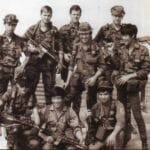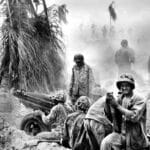From Green Beret to Renegade: The Transformation of Bo Gritz
Bo Gritz, a name synonymous with both valor and controversy, presents a perplexing study in contrasts. A highly decorated Green Beret, he served with distinction in the Vietnam War, earning accolades for his bravery. Yet, this same man would later become a prominent voice of anti-government sentiment, challenging the very system he once swore to uphold. This article explores the complex trajectory of Bo Gritz, from war hero to anti-establishment figure.
The Vietnam War and Its Lingering Shadows
Gritz’s transformation is inextricably linked to the Vietnam War. The conflict profoundly impacted him, perhaps fostering a sense of disillusionment and betrayal that would later fuel his anti-government stance. He became convinced, despite official denials and a lack of verifiable proof, that American prisoners of war (POWs) remained captive in Southeast Asia long after the war’s end. This belief became a driving force, leading him to embark on numerous, often unauthorized, missions into hostile territory in attempts to locate and rescue these lost soldiers. These missions, while lauded by some as heroic, were viewed by others as reckless and potentially harmful.
The POW/MIA Obsession: Catalyst for Disillusionment
Gritz’s unwavering belief in the abandoned POWs likely contributed to his growing distrust of the government. He felt betrayed, convinced that the authorities were not only failing to bring these men home but actively concealing their existence. This seed of disillusionment may have gradually blossomed into outright opposition to the establishment. It’s important to understand the context of the time – a period of growing social and political unrest – which may have further influenced his shift in perspective. Some theorists even suggest that his missions might have inadvertently complicated official repatriation efforts, potentially endangering any remaining captives. You can learn more about the history of the 101st Airborne Division, a unit with a rich history in American military engagements, including Vietnam, through this informative piece on the 101st Airborne Division patch.
A Descent into Extremism
As Gritz’s distrust deepened, his political views shifted dramatically. He gravitated toward anti-government groups, embracing ideologies that ran counter to the values he once defended as a soldier. He became increasingly associated with far-right movements, aligning himself with individuals and organizations espousing white supremacist views. His involvement in the Ruby Ridge standoff in 1992, a deadly confrontation between federal agents and the Weaver family in Idaho, further cemented his anti-establishment credentials. While Gritz acted as a negotiator, his presence arguably lent legitimacy to the anti-government sentiment surrounding the event. This period saw him become a prominent figure within the Patriot movement, a complex and often-misunderstood network of individuals and groups espousing a range of anti-government and survivalist ideologies.
A Run for the Presidency and a Polarizing Legacy
In 1992, Gritz took his anti-establishment views to the national stage, launching a bid for the presidency on the Populist Party ticket. His campaign platform centered on individual liberties, limited government intervention, and a deep skepticism of federal authority. He resonated with a segment of the population that felt marginalized and disenfranchised, those who shared his distrust of the established order. While his presidential bid was ultimately unsuccessful, it provided a platform for his views and further solidified his image as an anti-government icon. It’s worth noting that Gritz has been linked to the inspiration for the fictional character John Rambo, although this connection remains a subject of debate.
Unraveling the Enigma of Bo Gritz
Understanding Bo Gritz’s complex journey requires acknowledging the multiple influences that likely shaped his worldview. His wartime experiences, the perceived betrayal of the POW/MIA issue, the prevailing political climate, and possibly even a predisposition toward certain beliefs probably all played a role. It’s a cautionary tale that underscores the powerful influence of disillusionment and the seductive nature of extremist ideologies. There’s still much we don’t fully understand about Gritz’s motivations and the nuances of his beliefs. What remains clear is that his story provides a compelling lens through which we can examine the complex interplay of patriotism, disillusionment, and the search for truth in a world grappling with uncertainty.
| Key Aspects of Bo Gritz’s Life | Description |
|---|---|
| Military Service | Decorated Green Beret in Vietnam, recipient of multiple awards for valor. |
| POW/MIA Activism | Dedicated efforts to rescue American POW/MIAs, ultimately unsuccessful. |
| Anti-Government Stance | Embraced far-right ideologies and conspiracy theories, critical of government power. |
| Ruby Ridge Involvement | Participation solidified his anti-government image. |
| Presidential Campaign | Ran for President in 1992 on a Populist Party platform of limited government. |
Who is Bo Gritz? Deconstructing the Myth
James Gordon “Bo” Gritz, a name that resonates within military history and the realm of American political extremism, offers a compelling case study in transformation. This section delves deeper into the journey of this decorated Green Beret, from the jungles of Vietnam to the heart of anti-government sentiment. His story isn’t a simple narrative of good versus evil; it’s a winding path marked by bravery, disillusionment, and ultimately, a descent into a world of controversial ideologies. It is important to note that accusations of exploiting the POW/MIA issue and questions about the legitimacy of some of his military awards have followed Gritz throughout his career.
A Soldier’s Journey: From Valor to Disillusionment
Gritz’s military service in Vietnam was exemplary. He repeatedly demonstrated courage under fire, earning numerous medals, including the Silver Star, the Legion of Merit, and the Purple Heart. However, these same experiences, coupled with the turbulent socio-political climate of the era, may have sown the seeds of his later disillusionment. It is worth considering that Gritz’s wartime experiences could have had a profound psychological impact, potentially shaping his later actions and beliefs. It is equally important to evaluate these claims with a critical eye, recognizing that the narrative around Gritz is often fraught with both admiration and condemnation.
The Allure of Conspiracy and the Rise of Anti-Government Sentiment
After his military career, Gritz became consumed by the plight of American POW/MIAs in Southeast Asia. His dedication to their cause led him to embark on several missions aimed at rescuing these lost soldiers. While his intentions may have been noble, there is debate over the validity of the information that inspired his efforts. These expeditions ultimately proved fruitless, yielding no concrete evidence of surviving POWs. Some experts suggest that these failures, combined with a growing distrust of the government’s handling of the situation, probably fueled Gritz’s burgeoning anti-establishment views. This period saw him becoming increasingly vocal about his beliefs, joining the chorus of voices within the burgeoning Patriot movement. It is important to analyze the impact Gritz’s rhetoric had on the wider movement, considering both his charismatic personality and his increasingly extreme views.
Ruby Ridge and the Solidification of an Anti-Government Icon
The Ruby Ridge standoff in 1992 became a pivotal moment in Gritz’s story, solidifying his image as an anti-government figurehead. His involvement, although as a negotiator, placed him firmly within the narrative of right-wing extremism. Gritz’s actions during this siege, where federal agents faced off against Randy Weaver and his family, highlight the tangled relationship between activism, extremism, and the use of force. Later that same year, his presidential campaign further amplified his voice within the anti-government movement, providing a platform for his beliefs and attracting a segment of the population who felt similarly disenfranchised.
Understanding the Complexities of Bo Gritz
Understanding Bo Gritz requires a nuanced perspective. His story is a cautionary tale, illustrating how idealism can transform into something more radical when fueled by disillusionment, perceived betrayal, and the allure of conspiracy theories. Ongoing research continues to explore the various influences that shaped his life and legacy, recognizing the ongoing debate around him. It’s crucial to examine Gritz’s narrative within the broader context of the American militia movement and its often violent history.
| Key Events & Beliefs | Description |
|---|---|
| Military Service | Decorated Green Beret, Vietnam War veteran |
| POW/MIA Pursuit | Led unauthorized rescue missions |
| Extremist Affiliations | Associated with right-wing groups, involved in Ruby Ridge |
| Presidential Campaign | Ran for President in 1992 |
| Conspiracy Theories | Promoted “New World Order” and other conspiracy narratives |
The Gritz Narrative and the POW/MIA Issue: A Deeper Dive
Bo Gritz’s post-Vietnam War life took a dramatic turn as he became deeply involved in the emotionally charged issue of American POWs and MIAs in Southeast Asia. His unwavering conviction that American soldiers remained captive, abandoned by their government, fueled numerous privately funded missions into Laos and Vietnam. These missions, often clandestine and based on what some considered questionable evidence, became a focal point of controversy. Even though a court case in 1989 cleared him of related charges, skepticism about the legitimacy of his claims persists. This chapter of Gritz’s story leaves a complex legacy: a blend of undeniable bravery, deep patriotism, and a cloud of doubt.
A Nation’s Angst and the Rise of a Controversial Figure
Gritz’s fervor resonated deeply with many Americans, particularly those who felt the government had failed its soldiers and their families. The POW/MIA issue became a national obsession, fueled by uncertainty, grief, and a sense of betrayal. Gritz, with his military credentials and impassioned rhetoric, became a symbol of hope for some, a dangerous rogue agent to others. Some commended him for keeping the issue in public discourse while others criticized him for possibly causing harm with his unorthodox methods.
The Vietnam War’s Unhealed Wounds
The Vietnam War left deep scars on the American psyche. The official narrative surrounding the war often clashed with the experiences and beliefs of veterans and families of the missing, creating a climate of distrust and suspicion. This provided fertile ground for figures like Gritz to emerge, offering an alternative narrative that some were eager to embrace. Gritz’s charisma and his firsthand experience in the region lent weight to his assertions, even as evidence remained elusive.
A Tangled Web of Claims and Allegations
Gritz’s POW/MIA efforts were fraught with controversy. Some suspected his missions were a cover for other activities while others believed he was sincerely driven by the hope of rescuing abandoned soldiers. While some argued that his unauthorized actions jeopardized official diplomatic efforts, others maintained that his persistence kept the pressure on the government to continue its search efforts. Adding another layer to this narrative is Gritz’s reported connection with billionaire H. Ross Perot, who allegedly tasked Gritz with investigating the POW/MIA issue.
The Search for Truth: Ongoing Research and Evolving Perspectives
The full story of Bo Gritz and the POW/MIA issue remains a subject of ongoing discussion and research. Historians, journalists, and researchers continue to sift through declassified documents, analyze eyewitness accounts, and attempt to reconcile conflicting narratives. While definitive answers may remain elusive, the pursuit of truth continues. It’s a quest that underscores the complexities of history and the enduring impact of war and its aftermath. It also highlights the powerful influence of belief and the human need for closure in the face of loss and uncertainty. Gritz’s story, though controversial, contributes to our understanding of this emotional chapter in American history.
- Unveiling Bernhard Caesar Einstein’s Scientific Achievements: A Legacy in Engineering - July 15, 2025
- Uncover who is Jerry McSorley: CEO, Family Man, Business Success Story - July 15, 2025
- Discover Bernhard Caesar Einstein’s Scientific Contributions: Unveiling a Legacy Beyond Einstein - July 15, 2025
















1 thought on “Bo Gritz: The Controversial Journey From War Hero to Anti-Government Icon”
Comments are closed.